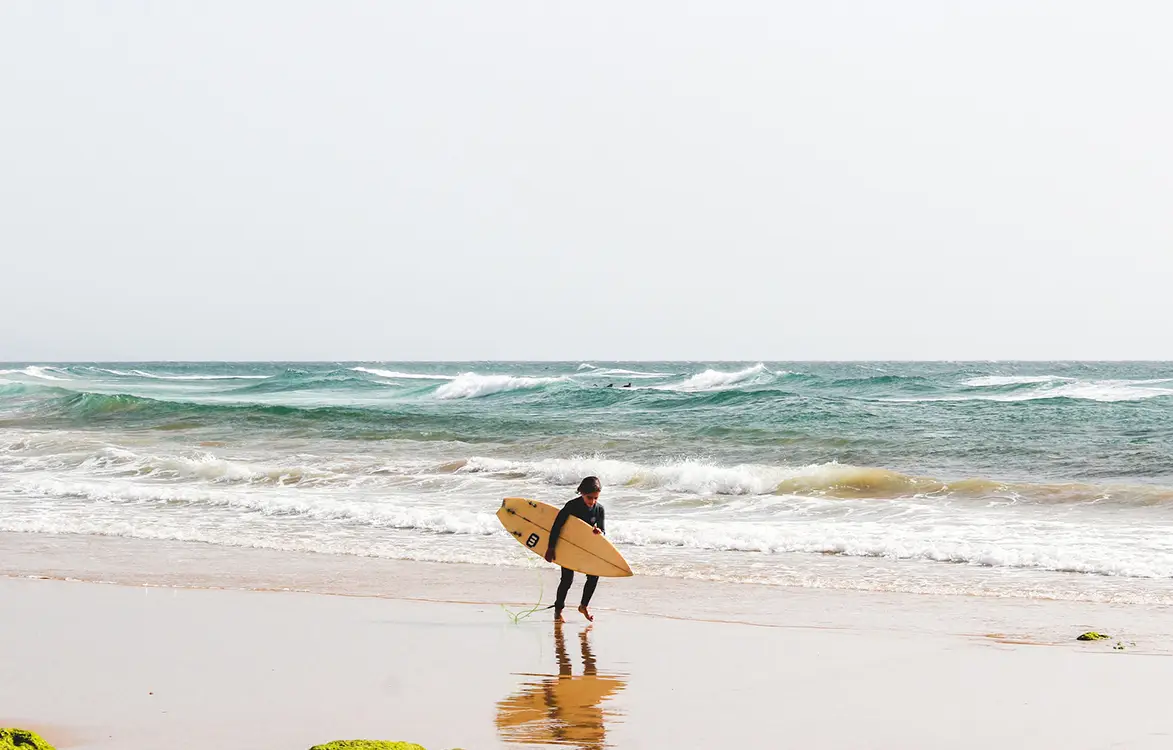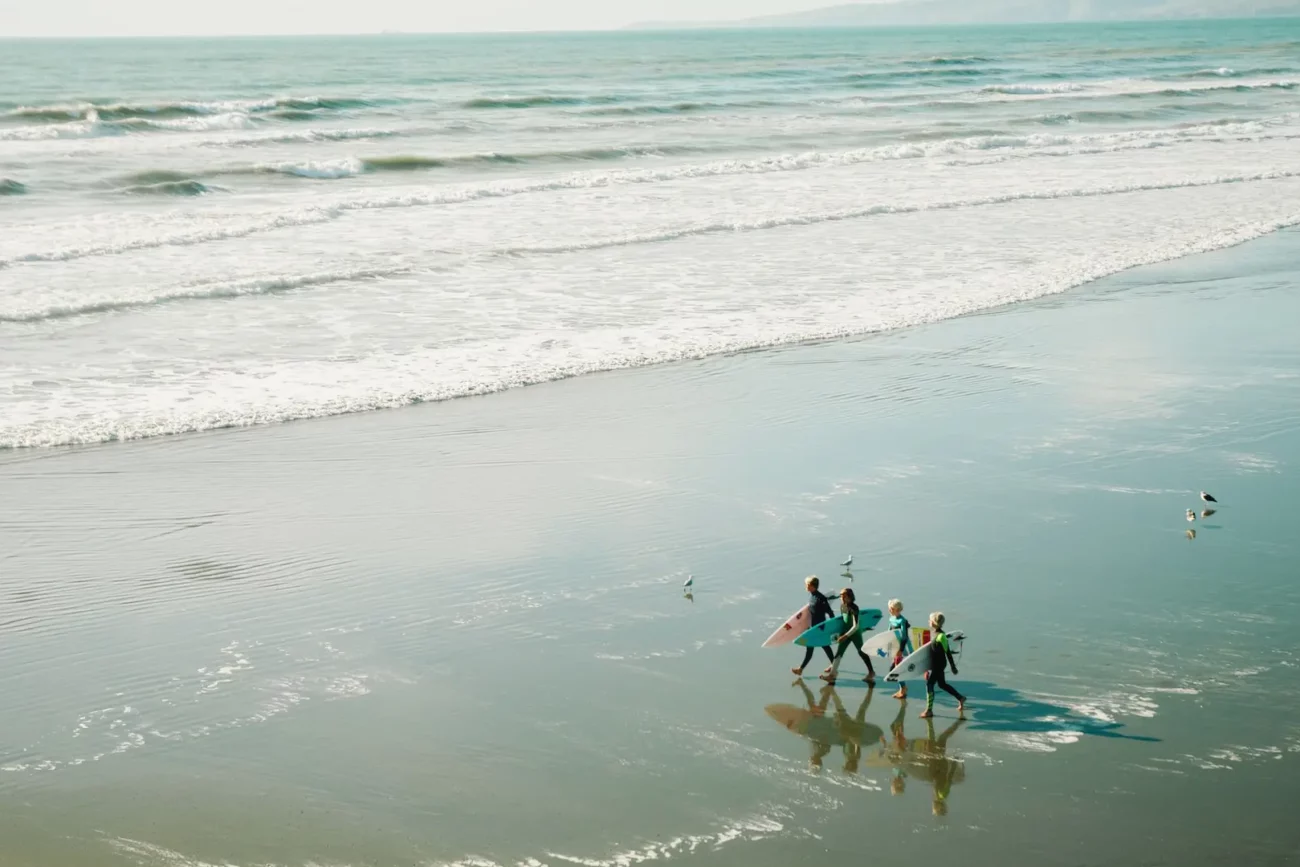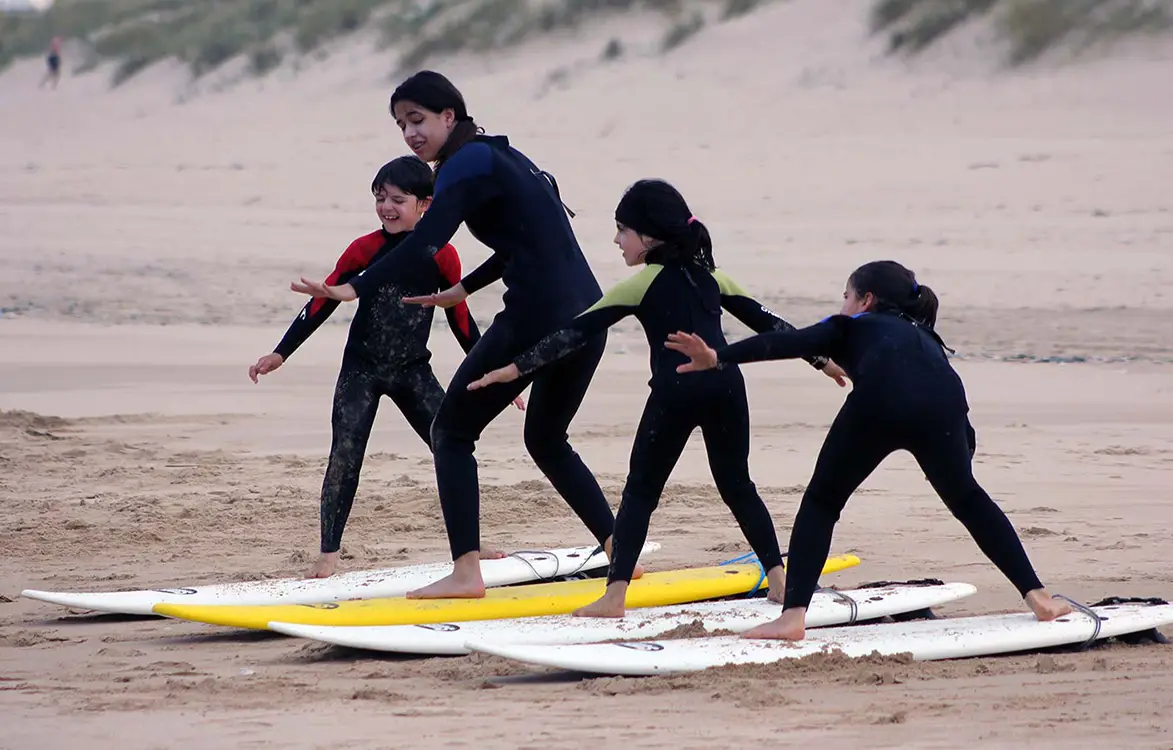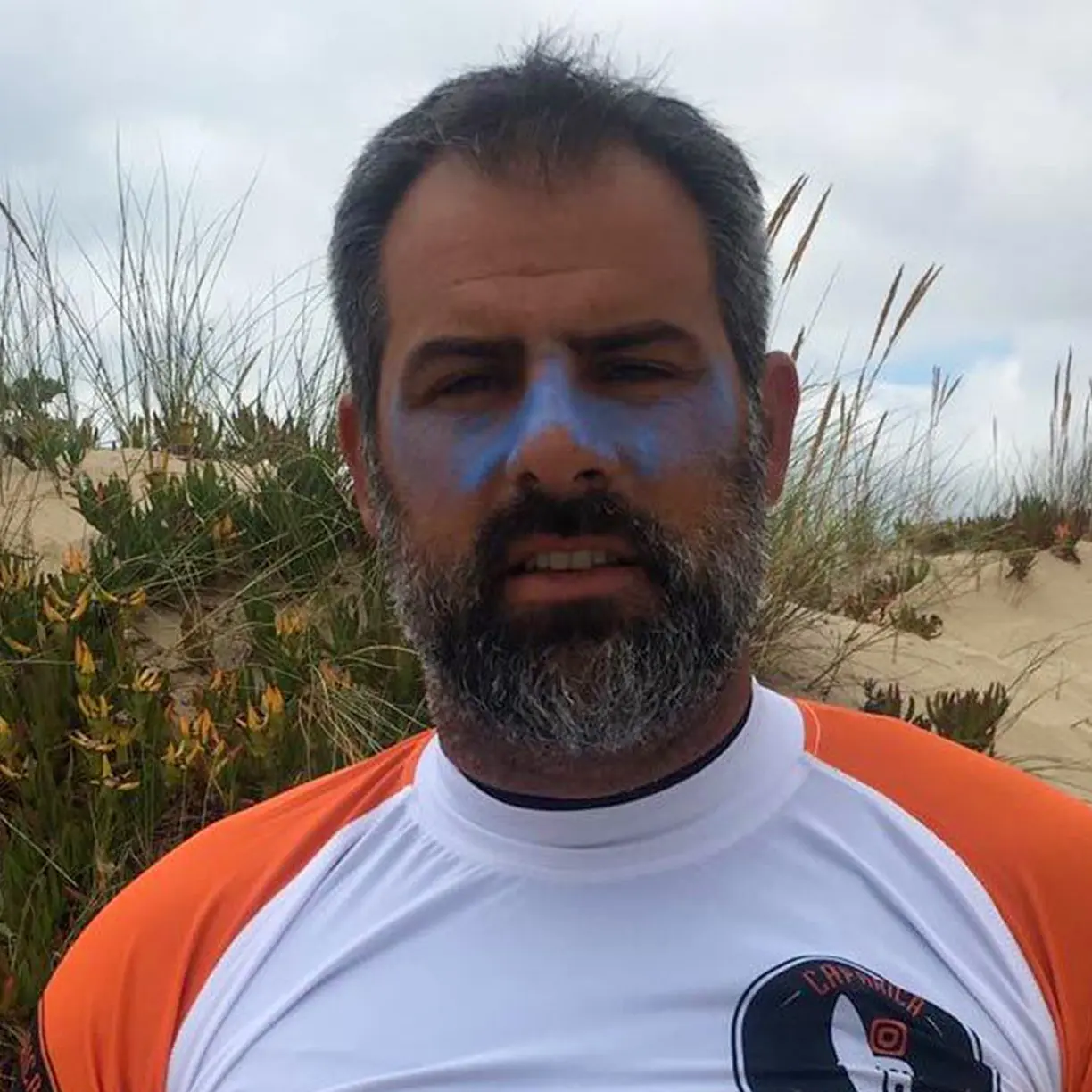Surf lessons for kids are a fun and exciting way to introduce the young to the world of surfing. During these lessons, children have the opportunity to learn the basics of the sport, develop surfing skills, and enjoy the ocean.
The surf lessons for kids offer a series of significant benefits. They promote physical development, improving the strength, endurance, and balance of children. Moreover, surf lessons also have mental health benefits, helping children develop confidence, self-esteem, and resilience skills.
The ideal age for children’s surf lessons varies, but generally starts from 6 years old, when children have more developed motor skills and can follow basic safety instructions. However, it’s important to consider the level of comfort and the level of adaptation to the aquatic environment of each child before enrolling them in lessons.
To participate in surf lessons, children generally should have basic swimming skills and be comfortable in the water. Additionally, it’s essential that they use appropriate safety equipment such as life jackets and neoprene suits to ensure protection during the lessons.
During surf lessons for kids, one can expect a mix of fun and learning. Children will learn the basic concepts of surfing, such as paddling, standing up on the board, and balance. Moreover, they will also have the opportunity to practice surfing techniques on waves suitable for their skill level.
To ensure safety during the surf lessons for kids, it’s essential to follow some important tips. Besides using appropriate safety equipment, it’s important to choose a reliable surf school, with experienced instructors who follow all safety standards. It’s also essential to teach children the basic safety rules at sea, such as the importance of respecting currents and ocean conditions.
To find a suitable surf school for children, it’s advisable to research and check the options available in your area. Some important criteria to consider include school reputation, instructor qualification, student/instructor ratio, and implemented safety measures.
Main Points:
- Benefits of surf lessons for kids: The lessons help in the physical, emotional, and social development of children, improve motor coordination, and promote a healthy lifestyle.
- Ideal age for surf lessons: The recommended age is from 6 years old, when the child already has more emotional maturity and basic motor skills.
- Safety tips: It’s important to use protective equipment, respect the sea limits, and always be accompanied by a qualified instructor to ensure safety during surf lessons for kids.
What are Surf Lessons for kids?
Surf lessons for kids are activities where the little ones learn to surf in a safe and supervised environment. During these lessons, qualified surf instructors teach basic surfing techniques like paddling, standing up on the board, and catching waves. Moreover, children also learn about the importance of water safety and how to respect the ocean. These lessons are a great way to introduce the little ones to the sport and encourage an active and healthy lifestyle from an early age.
What are the Benefits of Surf Lessons for kids?
The practice of surfing for children brings numerous physical, mental, and social benefits. Here are some of them:
- Physical development: Surfing is a complete sport that improves strength, balance, motor coordination, and cardiovascular endurance in children.
- Confidence and self-esteem: Overcoming challenges at sea and learning new skills help children build confidence and boost their self-esteem.
- Contact with nature: The contact with the sea and the beach provides a unique connection with nature, stimulating respect and care for the environment.
- Discipline and perseverance: The practice of surfing requires discipline, persistence, and focus, helping children evolve these important skills.
- Sociability: Surf lessons provide a favorable social environment, where children can make new friends and interact with instructors and peers.
Curiosity: Did you know that surfing is an ancient sport, being practiced for over 4,000 years in Polynesia?

Ideal Age for Surf Lessons for Kids
The ideal age to start surf lessons varies according to the physical and emotional development of the student. The first contact with surfing generally happens when children have the balance and coordination necessary to start practicing surfing. It’s also important to consider emotional maturity and the ability to follow instructions. Each child is different, so it’s essential to evaluate individually before starting lessons. Moreover, it’s crucial to ensure the safety of children during surf lessons, through the use of appropriate safety equipment.
What are the Requirements for Children to Participate in Surf Lessons?
For children to participate in surf lessons, it’s important that they meet some basic requirements. Firstly, it’s fundamental that they have a minimum recommended age, generally from 5 or 6 years old, depending on the surf school. Moreover, it’s important that children know how to swim and are familiar with the water. It’s also necessary that parents or guardians authorize participation in the lessons and are present during the activities. Having appropriate equipment, like surfboards suitable for the child’s size and the use of life jackets, is also essential to ensure safety during the lessons.

What to Expect from Surf Lessons for Kids?
Surf lessons for kids are an excellent way to introduce the little ones to the world of surfing and promote their physical and emotional development. During the lessons, children have the opportunity to learn the basic fundamentals, such as paddling and standing up on the board, besides being encouraged to perfect balance and coordination. Specialized instructors provide a safe and fun environment, where children can challenge themselves and have fun in the water. Moreover, surf lessons also teach values like respecting the sea and teamwork. Therefore, when choosing surf lessons for kids, expect an exciting and enriching experience for them.
Interesting fact: Surf lessons can benefit the emotional development of children, promoting confidence, self-esteem, and proactivity.
What Techniques and Skills are Taught?
Surf lessons for kids aim to teach technical skills and specific skills for the practice of this water sport. During the lessons, instructors generally teach the following techniques and skills:
- Paddling and correct positioning on the board;
- Balancing on the board and standing up;
- Performing basic maneuvers, like turning and sliding on the wave;
- Learning to read sea conditions and identify the best waves to surf;
- Developing strength, flexibility, and motor coordination;
- Knowing and respecting the safety rules and surf etiquette.
These techniques and skills are essential for children to enjoy surfing safely and become skilled surfers in the future.
Suggestions:
- Encourage your child to practice surfing regularly to hone their skills;
- Consider enrolling your child in advanced-level surf lessons to improve their techniques;
- Participation in children’s surf competitions to promote the development of your child’s skills;
- Be present in the surf lessons of your child to support and encourage their progress.

Necessary Equipment for Surf Lessons
The introduction of necessary equipment for surf lessons is fundamental to ensure the safety and utilization of children. Below are some items that are necessary during the lessons:
- Surfboard: Choose a board suitable for the size and skill of the child.
- Leash: It’s a rope that connects the board to the child’s ankle, preventing them from separating from the board.
- Rashguard: A long-sleeved shirt made of durable and quick-drying material that protects the skin from the sun and friction with the board.
- Sunscreen: To protect the child’s skin from UV rays during the lessons.
- Neoprene suit: It’s important for the child to stay warm during the lessons, especially in colder waters.
- Wax: A wax that is applied on the surfboard to ensure better grip of the child’s feet.
Safety Tips for Surf Lessons for Kids
- Choose a surf school with qualified instructors and experienced in teaching children.
- Check if the school has appropriate safety equipment, like life jackets, if necessary, and leash.
- Ensure that the lessons are conducted on beaches with suitable waves for beginner children.
- Make sure that the school follows the safety protocols, like evaluating sea conditions and teaching rescue techniques.
Interesting fact: According to research, surf lessons for kids can help in the development of motor skills, balance, and confidence.
What Are the Main Risks and How to Avoid Them?
When offering surf lessons for children, it’s important to be aware of the main risks involved and take the necessary measures to avoid them. Here are some tips to ensure safety during the lessons:
- Physical injuries: Children should receive appropriate safety equipment, like life jackets and leash, to prevent drownings and injuries.
- Sea conditions: Check the sea conditions before starting the lesson. Avoid days with very large waves, strong currents, or dangerous weather conditions.
- Adequate supervision: Ensure that there are specialized instructors present during the lessons to monitor the children and ensure their safety.
- Sun protection: Children should be protected from the sun with sunscreen, UV protection clothes, and hats during the lessons.
- Clear communication: Explain to the children the risks involved and instruct them on the safety measures to be followed during the lessons.
By adopting these precautions, it’s possible to minimize risks and provide children with a fun and safe experience during surf lessons.
How to Find a Surf School for Children
Finding a suitable surf school for children can be a challenge, but with some tips, it’s possible to make the right choice. Here are some important considerations:
- Research: Do online research to find surf schools that offer specific lessons for children.
- Reputation: Check the reputation of the school, read reviews from other parents, and ask other surfers about the quality of the lessons.
- Qualified instructors: Ensure that the school has experienced and qualified instructors to teach children.
- Safety: Check if the school follows appropriate safety measures, like having lifeguards present during the lessons or adapt other safety measures.
- Location: Consider the location of the surf school in relation to your home and the accessibility of the place.
Interesting fact: By learning to surf from a young age, children can develop physical skills like balance and coordination, besides gaining confidence and connecting with nature.
What are the Selection Criteria for a Surf School?
When choosing a surf school for children, it’s important to consider some essential criteria. Here are some useful tips:
- Experience and qualification of instructors: Check if the instructors have experience in teaching children and if they possess the appropriate certifications.
- Safety: Ensure that the school prioritizes safety, providing suitable protective equipment and following surf safety standards.
- Class size: Prefer schools that offer smaller classes, allowing each child to receive individualized attention and learn more effectively.
- Reviews and recommendations: Research about the school’s reputation, read reviews from other parents, and ask for recommendations.
- Welcoming environment: Choose a school that offers a positive and encouraging environment for the children, promoting the love for surfing and skill development.
Professional tip: Visit the surf school in person and talk to the instructors before making a final decision. This will help you get a better idea of the environment and teaching approach of the school.
Some Facts about Surf Lessons for Kids:
- ✅ Surfing is a challenging sport, hence, children usually start in surf schools before heading out to the sea on their own. (Source: SurfConnect)
- ✅ The number of surf schools is increasing due to the growing popularity of the sport. (Source: SurfConnect)
- ✅ Surf schools are important to teach beginners how to surf and understand surf etiquette. (Source: SurfConnect)
- ✅ They also provide a safe and fun environment for learning. (Source: SurfConnect)
- ✅ Some surf schools offer specialized lessons for athletes looking to improve their skills. (Source: SurfConnect)
Frequently Asked Questions
1. What are the best schools for surf lessons for kids in Costa da Caparica?
In Costa da Caparica, there are several respected schools offering surf lessons for kids. A well-rated children’s surf school is one that provides a safe, playful, and enjoyable surfing experience, with instructors experienced in teaching the basic techniques of surfing to the little ones. Adapting to the aquatic environment is a crucial step for each child to feel comfortable and ready to evolve. The extra care put into safety is essential for a positive experience.
2. What can children learn in surf clinics offered by a surf school for children?
In surf clinics, children can have their first contact with surfing, learn the basic techniques of the sport, from warming up, initiating on the sand to practicing in the water. Additionally, safety rules are taught as well as how to respect the sea and other surfers. They may also be introduced to other activities like bodyboarding and stand up paddle, promoting a complete and diversified surf experience.
3. What should I look for in a surf school for children to ensure a safe and fun surfing experience?
It’s crucial that the school has qualified surf instructors, providing a safe and playful environment. Properly maintained and suitable equipment, along with a pedagogical approach that promotes fun, respect for the sea, and progression in surfing are aspects to consider. Moreover, extra-curricular activities and the possibility to participate in surf camps can enrich the children’s surfing experience.
4. How can surf camp benefit children who are learning to surf?
A surf camp can provide a deeper immersion into the world of surfing, allowing children to practice intensively, hone their skills, and evolve from beginner to intermediate. Besides surfing, camps offer other fun activities and the chance to make new friendships, all in a safe environment supervised by experienced surf instructors.
5. What are the other activities offered by surf schools for children besides surf lessons?
Besides surf and bodyboard lessons, some schools offer stand up paddle, themed birthday parties, surf clinics, and free-time activities like beach games and nature contact. These activities complement the surfing experience, providing a richer and more enjoyable learning experience.
6. Is it possible to organize surf-themed birthday parties for children at a surf school?
Yes, many surf schools for children offer birthday party packages with a surf theme. These parties include fun and safe surf lessons, beach games, and even snacks. It’s a great way to celebrate a birthday, providing a memorable surf experience for the children and their friends. For more information and bookings, it’s recommended to contact the surf school of your choice directly.
